October 20, 2020
 I’ve had a Death of a Red Heroine Cocktail Talk post, years ago, and a few other Cocktail Talks from Qiu Xiaolong’s Chief Inspector Chen Cao series, which is a fantastic melding of police mysteries, poetry, epicurean delights, and great insights into changing Chinese culture starting in the late 80s, and focusing mainly on Shanghai, but moving around China here and there. They’re very enveloping and involving reads, and Death of a Red Heroine is the very first, and a fine (as you might guess) way to start the series – you’ll want to read them all, in a row. I recently (like I do with books I like lots) re-read it, and now am plowing fast into a few other Inspector Chen’s, too. And, I found another Cocktail Talk-worthy quote in the re-reading, which is both a good hangover note, and a good look into the books in a way, not that it comes from Chen (or his partner, the wonderful Detective Yu, who is a co-star really, with lots of plot coming from his point-of-view), but from a classic Chinese poet, as the books are dotted with quotes. This one is from Liu Yong, from the Song dynasty.
I’ve had a Death of a Red Heroine Cocktail Talk post, years ago, and a few other Cocktail Talks from Qiu Xiaolong’s Chief Inspector Chen Cao series, which is a fantastic melding of police mysteries, poetry, epicurean delights, and great insights into changing Chinese culture starting in the late 80s, and focusing mainly on Shanghai, but moving around China here and there. They’re very enveloping and involving reads, and Death of a Red Heroine is the very first, and a fine (as you might guess) way to start the series – you’ll want to read them all, in a row. I recently (like I do with books I like lots) re-read it, and now am plowing fast into a few other Inspector Chen’s, too. And, I found another Cocktail Talk-worthy quote in the re-reading, which is both a good hangover note, and a good look into the books in a way, not that it comes from Chen (or his partner, the wonderful Detective Yu, who is a co-star really, with lots of plot coming from his point-of-view), but from a classic Chinese poet, as the books are dotted with quotes. This one is from Liu Yong, from the Song dynasty.
Where shall I find myself
Tonight, waking from the hangover –
The riverbank lined with weeping willows,
The moon sinking, the dawn rising on a breeze.
Year after year, I will be far,
Far away from you.
All the beautiful scenes are unfolding,
But to no avail:
Oh, to whom can I speak
Oh this ever-enchanting landscape?
–Liu Yong, quoted in Death of a Red Heroine, by Qiu Xiaolong
October 13, 2020
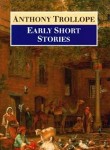 The third of our Cocktail Talks from the Trollope collection Early Short Stories (be sure to catch up on Part I and Part II, so as not to cause Trollope any sadness in the great library beyond) takes place in Rome, amongst a group of writerly and artistically and wannna-be ex-pats, and includes a little, oh, confused affection let’s say, and some bubbly, and some ruins, and Trollope’s eye into human foibles and drive, and ability to picture the 1800’s scene perfectly. Oh, before you pour the below though, don’t miss the array of past Anthony Trollope Cocktail Talk posts, which are oodles of fun, too.
The third of our Cocktail Talks from the Trollope collection Early Short Stories (be sure to catch up on Part I and Part II, so as not to cause Trollope any sadness in the great library beyond) takes place in Rome, amongst a group of writerly and artistically and wannna-be ex-pats, and includes a little, oh, confused affection let’s say, and some bubbly, and some ruins, and Trollope’s eye into human foibles and drive, and ability to picture the 1800’s scene perfectly. Oh, before you pour the below though, don’t miss the array of past Anthony Trollope Cocktail Talk posts, which are oodles of fun, too.
She did not come among us on the occasion of this banquet, possibly because we had no tables there to turn in preparation for her presence; but, had she done so, she could not have been more eloquent of things of the other world than was Mrs. Talboys. I have said that Mrs. Talboys’ eye never glanced more brightly after a glass of Champagne, but I am inclined to think that on this occasion it may have done so. O’Brien enacted Ganymede, and was, perhaps, more liberal than other latter-day Ganymedes, to whose services Mrs. Talboys had been accustomed. Let it not, however, be suspected by any one that she exceeded the limits of a discreet joyousness. By no means! The generous wine penetrated, perhaps, to some inner cells of her heart, and brought forth thoughts in sparkling words, which otherwise might have remained concealed; but there was nothing in what she thought or spoke calculated to give umbrage either to an anchorite or to a vestal. A word or two she said or sung about the flowing bowl, and once she called for ; but beyond this her converse was chiefly of the rights of man and the weakness of women; of the iron ages that were past, and of the golden time that was to come.
— Anthony Trollope, “Mrs. General Talboys”
October 6, 2020
 Recently, I had a Cocktail Talk from a story within the Anthony Trollope collection called, easily enough, Early Short Stories, a collection I picked up not long before that posting, thereby getting my complete Trollope collection that much closer to actual completion (and it’s pretty close!). Just to take a peek into the breadth of the Trollopean shelves, don’t miss the past Anthony Trollope Cocktail Talk posts, and for that matter don’t miss the Negus-packed Early Short Stories Part I post. But don’t miss this one, either, which takes place in Spain, which we visit alongside our English narrator. It’s one of my favorite stories in the collection, a comedy story of sorts, but also with the eye for detail and place most Trollope stories contain, and having the nice below sherry description.
Recently, I had a Cocktail Talk from a story within the Anthony Trollope collection called, easily enough, Early Short Stories, a collection I picked up not long before that posting, thereby getting my complete Trollope collection that much closer to actual completion (and it’s pretty close!). Just to take a peek into the breadth of the Trollopean shelves, don’t miss the past Anthony Trollope Cocktail Talk posts, and for that matter don’t miss the Negus-packed Early Short Stories Part I post. But don’t miss this one, either, which takes place in Spain, which we visit alongside our English narrator. It’s one of my favorite stories in the collection, a comedy story of sorts, but also with the eye for detail and place most Trollope stories contain, and having the nice below sherry description.
I landed at Cadiz, and was there joined by an old family friend, one of the very best fellows that ever lived. He was to accompany me up as far as Seville; and, as he had lived for a year or two at Xeres, was supposed to be more Spanish almost than a Spaniard. His name was Johnson, and he was in the wine trade; and whether for travelling or whether for staying at home—whether for paying you a visit in your own house, or whether for entertaining you in his—there never was (and I am prepared to maintain there never will be) a stauncher friend, choicer companion, or a safer guide than Thomas Johnson. Words cannot produce a eulogium sufficient for his merits. But, as I have since learned, he was not quite so Spanish as I had imagined. Three years among the bodegas of Xeres had taught him, no doubt, to appreciate the exact twang of a good, dry sherry; but not, as I now conceive, the exactest flavour of the true Spanish character. I was very lucky, however, in meeting such a friend, and now reckon him as one of the staunchest allies of the house of Pomfret, Daguilar, and Pomfret.
–Anthony Trollope, “John Bull On The Guadalquivir”
September 29, 2020
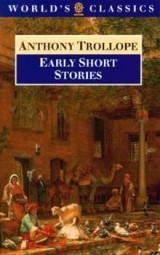 Oh, Anthony Trollope, what more can I say? I mean, I’ve had a whole bar’s worth of Anthony Trollope Cocktail Talk posts, with many words unfurled on my love of and like of nearly every book in the Anthony Trollope canon, as I own nearly every single book he wrote, which is saying something as he was prolific as apple pie (whatever that means; he wrote lots of books). But there are still a few books out in the book wild by Trollope that I don’t have, and every time I discover one, I am happy as, oh, a kid at their birthday. And guess what? The other day I did indeed find a Trollope book I didn’t have, the Early Short Stories collection. A couple stories in it I had read (in the Lotta Schmidt and Other Stories collection), but most I hadn’t, and it’s been a treat reading them, a treat! Many take place all-round-the-world, though the one we’re Cocktail Talk-ing today takes place in Ireland, where Trollope lived for years, and set a few early books, and is called “The O’Conors of Castle Conors,” and ends on a happy note and with at tray of . . . well, you’ll see below.
Oh, Anthony Trollope, what more can I say? I mean, I’ve had a whole bar’s worth of Anthony Trollope Cocktail Talk posts, with many words unfurled on my love of and like of nearly every book in the Anthony Trollope canon, as I own nearly every single book he wrote, which is saying something as he was prolific as apple pie (whatever that means; he wrote lots of books). But there are still a few books out in the book wild by Trollope that I don’t have, and every time I discover one, I am happy as, oh, a kid at their birthday. And guess what? The other day I did indeed find a Trollope book I didn’t have, the Early Short Stories collection. A couple stories in it I had read (in the Lotta Schmidt and Other Stories collection), but most I hadn’t, and it’s been a treat reading them, a treat! Many take place all-round-the-world, though the one we’re Cocktail Talk-ing today takes place in Ireland, where Trollope lived for years, and set a few early books, and is called “The O’Conors of Castle Conors,” and ends on a happy note and with at tray of . . . well, you’ll see below.
“And Patsey,” said she, “ride for your life; and Patsey, whatever you do, don’t come back without Mr. Green’s pumps—his dancing-shoes you know.”
And in about two hours the pumps did arrive; and I don’t think I ever spent a pleasanter evening or got more satisfaction out of a pair of shoes. They had not been two minutes on my feet before Larry was carrying a tray of Negus across the room in those which I had worn at dinner.
“The Dillon girls are going to stay here,” said Fanny as I wished her good night at two o’clock. “And we’ll have dancing every evening as long as you remain.”
— Anthony Trollope, “The O’Conors of Castle Conors”
September 22, 2020
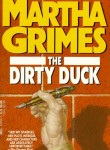 If by some strange twist of fate you missed The Dirty Duck Part I Cocktail Talk, then by all means, please, take a moment of time to read and reflect on it before you dive in here. Don’t worry, I’ll wait. Okay, back? If so, then you know more than this post will tell you about the book The Dirty Duck by Martha Grimes, as well as, perhaps, if you followed the link trail more about the book The Man With a Load of Mischief, also by said Martha. All of which would be good for you to know, me thinks, cause within both books good pubs feature prominently – heck, they provide the names for the books! And the actual Dirty Duck pub, and much/some of the action, is in lovely and Shakespeare-y Stratford Upon Avon. What I didn’t mention earlier is that in both books, Grimes has a character drinking old favorite Campari, which doesn’t make it into nearly enough books. I’m not 100% sure that our author loves the red bitter aperitivo as much as I do, though she seems like a decent person, and what decent person wouldn’t? Not a one.
If by some strange twist of fate you missed The Dirty Duck Part I Cocktail Talk, then by all means, please, take a moment of time to read and reflect on it before you dive in here. Don’t worry, I’ll wait. Okay, back? If so, then you know more than this post will tell you about the book The Dirty Duck by Martha Grimes, as well as, perhaps, if you followed the link trail more about the book The Man With a Load of Mischief, also by said Martha. All of which would be good for you to know, me thinks, cause within both books good pubs feature prominently – heck, they provide the names for the books! And the actual Dirty Duck pub, and much/some of the action, is in lovely and Shakespeare-y Stratford Upon Avon. What I didn’t mention earlier is that in both books, Grimes has a character drinking old favorite Campari, which doesn’t make it into nearly enough books. I’m not 100% sure that our author loves the red bitter aperitivo as much as I do, though she seems like a decent person, and what decent person wouldn’t? Not a one.
Her eyes actually seemed to be twinkling at him over the rim of her glass. What was she drinking? Naturally, Campari and lime.
–Martha Grimes, The Dirty Duck
September 15, 2020
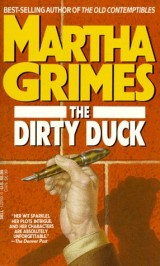 Not too long ago (if you consider the amount of time within all of time, for sure) I had a couple Cocktail Talks from a book by Martha Grimes called The Man With a Load of Mischief, a book I liked pretty well. Not sure why (as this often happens) I didn’t search out more books by Martha G at the time, but, well, I didn’t. However, recently (being at home more and thereby reading more) I was scouring the shelves for a book to re-read, and I picked up said Load, and liked it again. It – as it seems all her books starring Scotland Yard’s Richard Jury – is very pub-focused, which I also like (pubs, that is! and pub-focused books), and so decided I’d keep my eyes open for more. And, low and behold, with open eyes I found one, called The Dirty Duck. Now, Grimes in the book-back blurbs gets compared at times to Agatha Christie, and while she isn’t anywhere for me as good as the best Agatha, she may not be as bad as the worst Agatha either (cause when Agatha goes off the mark, it can be far off). With that said, The Dirty Duck isn’t a bad read. It’s a little, oh, lazy at times, and a little dated for being 1984 (though that was, now that I think about it, a ways behind us in time), but it’s also a lot of fun, has some pretty neat twists and a good mystery, and is very readable. Best of all – it takes place in Stratford Upon Avon! At least for the main, and you probably can guess that means lots of Shakespeare, which I’m always for, and also the main pub (the Dirty Duck pub, that is) is one I know, and one that features mightily (under the name The Mucky Mallard) in the tv show Shakespeare and Hathaway, which I am mightily (two “mightily”s!) fond of. If that wasn’t enough to get you going, the Thomas Nashe poem “Litany in a Time of Plague” provided key clues, and is not only a swell poem, but incredibly apt right now with our own plague. And if that wasn’t enough, there are some good drinking quotes in the book, starting with the below.
Not too long ago (if you consider the amount of time within all of time, for sure) I had a couple Cocktail Talks from a book by Martha Grimes called The Man With a Load of Mischief, a book I liked pretty well. Not sure why (as this often happens) I didn’t search out more books by Martha G at the time, but, well, I didn’t. However, recently (being at home more and thereby reading more) I was scouring the shelves for a book to re-read, and I picked up said Load, and liked it again. It – as it seems all her books starring Scotland Yard’s Richard Jury – is very pub-focused, which I also like (pubs, that is! and pub-focused books), and so decided I’d keep my eyes open for more. And, low and behold, with open eyes I found one, called The Dirty Duck. Now, Grimes in the book-back blurbs gets compared at times to Agatha Christie, and while she isn’t anywhere for me as good as the best Agatha, she may not be as bad as the worst Agatha either (cause when Agatha goes off the mark, it can be far off). With that said, The Dirty Duck isn’t a bad read. It’s a little, oh, lazy at times, and a little dated for being 1984 (though that was, now that I think about it, a ways behind us in time), but it’s also a lot of fun, has some pretty neat twists and a good mystery, and is very readable. Best of all – it takes place in Stratford Upon Avon! At least for the main, and you probably can guess that means lots of Shakespeare, which I’m always for, and also the main pub (the Dirty Duck pub, that is) is one I know, and one that features mightily (under the name The Mucky Mallard) in the tv show Shakespeare and Hathaway, which I am mightily (two “mightily”s!) fond of. If that wasn’t enough to get you going, the Thomas Nashe poem “Litany in a Time of Plague” provided key clues, and is not only a swell poem, but incredibly apt right now with our own plague. And if that wasn’t enough, there are some good drinking quotes in the book, starting with the below.
One of these Americans, Miss Gwendolyn Bracegirdle, who had never had more than an ounce of sweet sherry at a time on the veranda of her huge pink-stuccoed house in Sarasota, Florida, was standing with a friend in a shadowy corner of the terrace getting sloshed.
“Oh honey, not another! This here’s my second – what do they call it?”
“Gin.” Her companion laughed.
“Gin!” She giggled. “I definitely couldn’t.” But she held her glass in a way that said she definitely could.
–Martha Grimes, The Dirty Duck
Tags: Bars, Cocktail Talk, Father Brown Part II, Gin, Litany in a Time of Plague, Martha Grimes, pubs, Stratford Upon Avon, sweet sherry, The Dirty Duck
Posted in: Bars, Cocktail Talk, Gin, Sherry
September 1, 2020
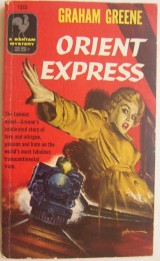 You’ll be forgiven if you dive in here thinking, automatically, that they’ll be a murder and a portly Belgian detective within this here Cocktail Talk, cause m’lady Christie’s book that shares the two words of the title is rather a big deal, but nope! Today, we’re Cocktail Talking with gregarious Graham Greene, which is also rather a big deal of course. But while his Orient Express isn’t the best known, or most highly thought of, book within Greene’s healthy and unmissable canon, it was the first of his (to use his own phrasing) “entertainment” books, and one written specifically with the movies in mind – though it begs, in many ways, for an updated film or tv treatment as there isn’t a good one that I know of. While not the top of the Greene list, the book’s a rollicking read in many ways, dated in some ways here and there, but moving at a fast clip, and with characters you begin to really care about, or, if that’s too fancy, become involved with, their stories, that is, and a few you might be happier to do without. Read it, if you haven’t, to see if you agree. And for now, enjoy the below drunkenness.
You’ll be forgiven if you dive in here thinking, automatically, that they’ll be a murder and a portly Belgian detective within this here Cocktail Talk, cause m’lady Christie’s book that shares the two words of the title is rather a big deal, but nope! Today, we’re Cocktail Talking with gregarious Graham Greene, which is also rather a big deal of course. But while his Orient Express isn’t the best known, or most highly thought of, book within Greene’s healthy and unmissable canon, it was the first of his (to use his own phrasing) “entertainment” books, and one written specifically with the movies in mind – though it begs, in many ways, for an updated film or tv treatment as there isn’t a good one that I know of. While not the top of the Greene list, the book’s a rollicking read in many ways, dated in some ways here and there, but moving at a fast clip, and with characters you begin to really care about, or, if that’s too fancy, become involved with, their stories, that is, and a few you might be happier to do without. Read it, if you haven’t, to see if you agree. And for now, enjoy the below drunkenness.
‘Oh, for God’s sake, come on, Mabel,’ Janet said.
Miss Warren’s mood changed. She straightened herself and barred the way. ‘You say I’m drunk. I am drunk. But I’m going to be drunker.’
‘Oh, come on.’
‘You are going to have one more drink with me or I shan’t let you on the platform.’
Janet Pardoe gave way. ‘One. Only one, mind.’ She guided Mabel Warren across a vast black shining hall into a room where a few tired men and women were snatching cups of coffee, ‘Another gin,’ said Miss Warren, and Janet ordered it.
–Graham Greene, Orient Express
August 25, 2020
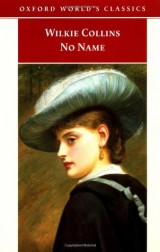 This is our final Cocktail Talk from Wilkie Collins’ dandy (if long, as a warning – not a scary warning, but just a “know what you’re getting into” warning – book) No Name. If you haven’t read the No Name Part I Cocktail Talk or the No Name Part II Cocktail Talk, I strongly suggest, in an amiable way, that you do, just to get more background on the book, learn about monks drinking grog and whiskey-swilling carriage drivers, and feel your day is complete. Also, those two follow the more traditional Spiked Punch Cocktail Talk style, in that they actually talk about drinks, spirits, booze, and all of that. WHAT! I can hear you say. “How can the below quote be a Cocktail Talk, without, well, cocktails (or such) in it?” Well, it is my site, but instead of belaboring that point, let me site precedence, in a past Cocktail Talk from one of Collins’ bosom buddies (in the main, though authors can be cranky, am I right?), Charles Dickens. Specifically, the Dombey and Son, Part IV Cocktail Talk, which is about one of my (which is saying a lot), maybe my all-time (which would really be saying a lot) Dickens’ characters, Diogenes the dog. And the below No Name Cocktail Talk is about dogs, too, in this case two dogs. Brutus and Cassius. They aren’t at Diogenes’ level – only some dogs are! – but they are good dogs, and this scene of their owner Admiral Bartram at dinner (being served by the books heroine – in disguise! – Magdalen) is charming. So, forgive the lack of booze below, but enjoy the abundance of pups.
This is our final Cocktail Talk from Wilkie Collins’ dandy (if long, as a warning – not a scary warning, but just a “know what you’re getting into” warning – book) No Name. If you haven’t read the No Name Part I Cocktail Talk or the No Name Part II Cocktail Talk, I strongly suggest, in an amiable way, that you do, just to get more background on the book, learn about monks drinking grog and whiskey-swilling carriage drivers, and feel your day is complete. Also, those two follow the more traditional Spiked Punch Cocktail Talk style, in that they actually talk about drinks, spirits, booze, and all of that. WHAT! I can hear you say. “How can the below quote be a Cocktail Talk, without, well, cocktails (or such) in it?” Well, it is my site, but instead of belaboring that point, let me site precedence, in a past Cocktail Talk from one of Collins’ bosom buddies (in the main, though authors can be cranky, am I right?), Charles Dickens. Specifically, the Dombey and Son, Part IV Cocktail Talk, which is about one of my (which is saying a lot), maybe my all-time (which would really be saying a lot) Dickens’ characters, Diogenes the dog. And the below No Name Cocktail Talk is about dogs, too, in this case two dogs. Brutus and Cassius. They aren’t at Diogenes’ level – only some dogs are! – but they are good dogs, and this scene of their owner Admiral Bartram at dinner (being served by the books heroine – in disguise! – Magdalen) is charming. So, forgive the lack of booze below, but enjoy the abundance of pups.
The two magnificent dogs sat squatted on their haunches, with their great heads over the table, watching the progress of the meal, with the profoundest attention, but apparently expecting no share in it. The roast meat was removed, the admiral’s plate was changed, and Magdalen took the silver covers off the two made-dishes on either side of the table. As she handed the first of the savory dishes to her master, the dogs suddenly exhibited a breathless personal interest in the proceedings. Brutus gluttonously watered at the mouth; and the tongue of Cassius, protruding in unutterable expectation, smoked again between his enormous jaws.
The admiral helped himself liberally from the dish; sent Magdalen to the side-table to get him some bread; and, when he thought her eye was off him, furtively tumbled the whole contents of his plate into Brutus’s mouth. Cassius whined faintly as his fortunate comrade swallowed the savory mess at a gulp. “Hush! you fool,” whispered the admiral. “Your turn next!”
Magdalen presented the second dish. Once more the old gentleman helped himself largely – once more he sent her away to the side-table, once more he tumbled the entire contents of the plate down the dog’s throat, selecting Cassius this time, as became a considerate master and an impartial man. When the next course followed – consisting of a plain pudding and an unwholesome “cream” – Magdalen’s suspicion of the function of the dogs at the dinner-table was confirmed. While the master took the simple pudding, the dogs swallowed the elaborate cream. The admiral was plainly afraid of offending his cook on the one hand, and of offending his digestion on the other – and Brutus and Cassius were the two trained accomplices who regularly helped him every day off the horns of his dilemma. “Very good! very good!” said the old gentleman, with the most transparent duplicity. “Tell the cook, my dear, a capital cream!”
–Wilkie Collins, No Name
 I’ve had a Death of a Red Heroine Cocktail Talk post, years ago, and a few other Cocktail Talks from Qiu Xiaolong’s Chief Inspector Chen Cao series, which is a fantastic melding of police mysteries, poetry, epicurean delights, and great insights into changing Chinese culture starting in the late 80s, and focusing mainly on Shanghai, but moving around China here and there. They’re very enveloping and involving reads, and Death of a Red Heroine is the very first, and a fine (as you might guess) way to start the series – you’ll want to read them all, in a row. I recently (like I do with books I like lots) re-read it, and now am plowing fast into a few other Inspector Chen’s, too. And, I found another Cocktail Talk-worthy quote in the re-reading, which is both a good hangover note, and a good look into the books in a way, not that it comes from Chen (or his partner, the wonderful Detective Yu, who is a co-star really, with lots of plot coming from his point-of-view), but from a classic Chinese poet, as the books are dotted with quotes. This one is from Liu Yong, from the Song dynasty.
I’ve had a Death of a Red Heroine Cocktail Talk post, years ago, and a few other Cocktail Talks from Qiu Xiaolong’s Chief Inspector Chen Cao series, which is a fantastic melding of police mysteries, poetry, epicurean delights, and great insights into changing Chinese culture starting in the late 80s, and focusing mainly on Shanghai, but moving around China here and there. They’re very enveloping and involving reads, and Death of a Red Heroine is the very first, and a fine (as you might guess) way to start the series – you’ll want to read them all, in a row. I recently (like I do with books I like lots) re-read it, and now am plowing fast into a few other Inspector Chen’s, too. And, I found another Cocktail Talk-worthy quote in the re-reading, which is both a good hangover note, and a good look into the books in a way, not that it comes from Chen (or his partner, the wonderful Detective Yu, who is a co-star really, with lots of plot coming from his point-of-view), but from a classic Chinese poet, as the books are dotted with quotes. This one is from Liu Yong, from the Song dynasty.


























